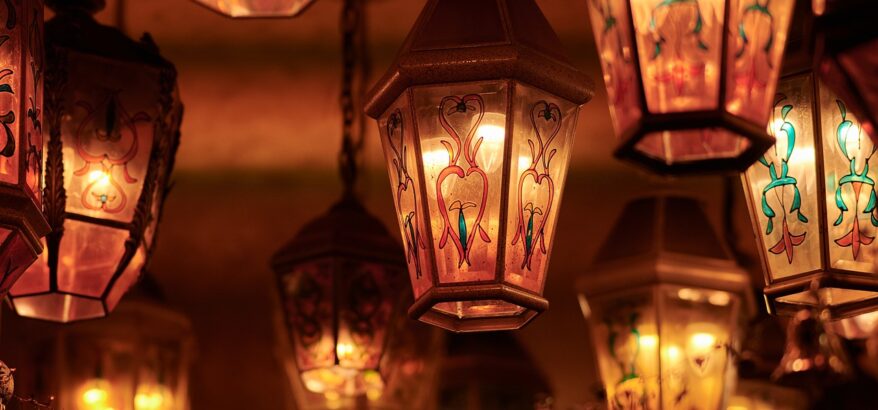Saudi Arabia is a land of rich cultural heritage and deep-rooted traditions, reflected vividly in its vibrant festivals and celebrations. From religious observances to traditional gatherings, these events offer a glimpse into the diverse tapestry of Saudi Arabian life. Let’s delve into some of the most captivating festivals and traditions that showcase the essence of this dynamic country.
1. Eid al-Fitr and Eid al-Adha
Eid al-Fitr and Eid al-Adha are two of the most significant festivals in Saudi Arabia, marking important milestones in the Islamic calendar. Eid al-Fitr, also known as the Festival of Breaking the Fast, is celebrated with great enthusiasm after the month-long fasting period of Ramadan. It is a time of joyous gatherings, where families come together to share festive meals, exchange gifts, and engage in acts of charity. The streets are adorned with colorful decorations, and children delight in receiving Eidi (gifts of money) from elders. Mosques are filled with worshippers offering special prayers of gratitude, marking the end of a month dedicated to spiritual reflection and self-discipline.
Similarly, Eid al-Adha, known as the Festival of Sacrifice, honors Prophet Ibrahim’s willingness to sacrifice his son as an act of obedience to God. This festival is characterized by the ritual sacrifice of animals, symbolizing devotion and obedience to Allah. Families partake in the distribution of meat to the less fortunate, fostering a sense of community and generosity. The days of Eid al-Adha are also filled with prayers, feasts, and social gatherings, reinforcing bonds of kinship and faith among Muslims in Saudi Arabia.
2. Janadriyah Cultural Festival
The Janadriyah Cultural Festival is a vibrant celebration of Saudi Arabia’s rich heritage and cultural diversity. Held annually, this festival attracts visitors from across the kingdom and around the world to experience traditional music, dance, arts, and crafts. The event serves as a platform for local artisans and craftsmen to showcase their skills, from intricate woodwork to exquisite handicrafts and traditional attire. Visitors can immerse themselves in the sights, sounds, and flavors of Saudi Arabia, gaining a deeper appreciation for its cultural tapestry.
Beyond the artistic showcases, the Janadriyah Festival also features exhibitions highlighting Saudi history, folklore, and customs. It offers educational insights into the kingdom’s past while celebrating its present cultural vitality. Visitors can explore interactive displays, attend cultural workshops, and engage with storytellers sharing tales of heritage and identity. The Janadriyah Cultural Festival stands as a testament to Saudi Arabia’s commitment to preserving its cultural legacy and promoting cultural exchange on a global stage.
3. Saudi National Day
Saudi National Day is a patriotic celebration that commemorates the unification of the Kingdom of Saudi Arabia on September 23rd. It is a day filled with national pride, festivities, and expressions of unity among Saudis across the country. The streets are adorned with the national flag, and buildings are illuminated with colorful lights, creating a festive atmosphere. Citizens and residents alike participate in parades, concerts, and cultural events that showcase the kingdom’s achievements and progress.
4. Hajj Pilgrimage
The Hajj pilgrimage is a profound spiritual journey for Muslims worldwide and holds special significance in Saudi Arabia, home to the holy cities of Mecca and Medina. Each year, millions of pilgrims from diverse backgrounds gather to perform the sacred rituals prescribed by Islam. The Hajj is a demonstration of unity, equality, and devotion as pilgrims dress in simple white garments and engage in acts of worship and supplication.
5. Traditional Weddings
Weddings in Saudi Arabia are elaborate affairs steeped in tradition, symbolism, and cultural significance. They are joyous celebrations that bring families and communities together in unity and celebration. Traditional Saudi weddings often blend age-old customs with modern influences, creating memorable experiences for the bride, groom, and guests alike.
6. Al-Jenadriyah Heritage and Cultural Festival
The Al-Jenadriyah Heritage and Cultural Festival, held annually in Riyadh, is a showcase of Saudi Arabia’s diverse heritage and cultural vibrancy. The festival brings together artisans, performers, historians, and visitors to celebrate the kingdom’s traditions through exhibitions, performances, and interactive experiences. It is a platform for preserving and promoting Saudi Arabia’s cultural identity while fostering dialogue and appreciation for its heritage.
7. Saudi Arabian Cuisine
Saudi Arabian cuisine is a culinary delight that reflects the country’s diverse culinary heritage, influenced by Bedouin traditions, regional flavors, and international culinary trends. From aromatic rice dishes like Kabsa to savory grilled meats like kebabs and Mandi, Saudi cuisine offers a delectable array of flavors and textures. Traditional desserts such as Baklava, Basbousa, and Luqaimat add a sweet touch to meals and celebrations.
8. Islamic New Year (Hijri New Year)
The Islamic New Year, also known as the Hijri New Year, marks the beginning of the lunar Islamic calendar and holds special significance for Muslims worldwide. In Saudi Arabia, the Hijri New Year is observed with prayers, reflections, and gatherings that commemorate the migration of Prophet Muhammad (PBUH) from Mecca to Medina. It is a time for spiritual renewal, gratitude, and setting intentions for the year ahead based on Islamic principles.
9. Al-Moulid
Al-Moulid is a religious festival in Saudi Arabia that commemorates the birth of Prophet Muhammad (PBUH) and is observed with reverence and devotion. It is a time for Muslims to reflect on the teachings and legacy of the Prophet, engage in prayers and supplications, and participate in acts of charity and goodwill. Al-Moulid brings communities together in spiritual solidarity, reinforcing the bonds of faith and shared values.
The festival is marked by special prayers, sermons, and gatherings at mosques and community centers across Saudi Arabia. It is a time of heightened spirituality and communal unity, as Muslims come together to celebrate the life and teachings of the Prophet Muhammad (PBUH). Al-Moulid serves as a reminder of the profound impact of the Prophet’s message and his enduring legacy of compassion, justice, and righteousness.
10. Traditional Crafts and Souks
Traditional crafts and souks (markets) play a significant role in Saudi Arabia’s cultural landscape, preserving age-old artisanal skills and showcasing local craftsmanship. Souks are vibrant hubs of activity, bustling with traders, artisans, and shoppers seeking unique goods and traditional products. Visitors to Saudi Arabia can explore souks filled with handmade textiles, pottery, jewelry, spices, and more, offering a glimpse into the country’s artistic heritage.

